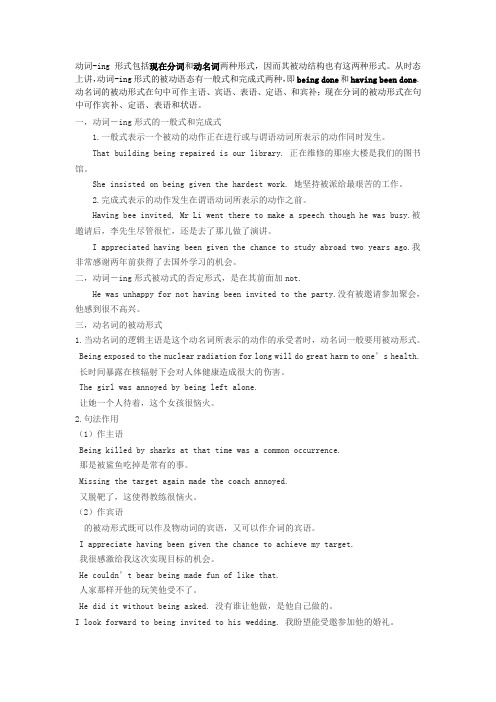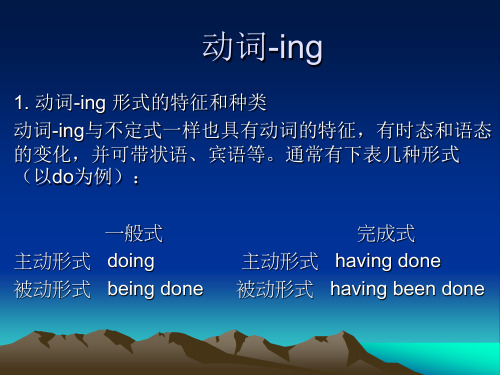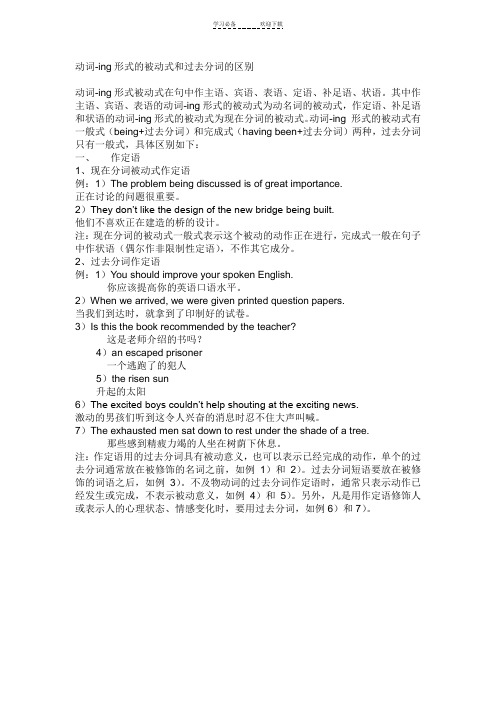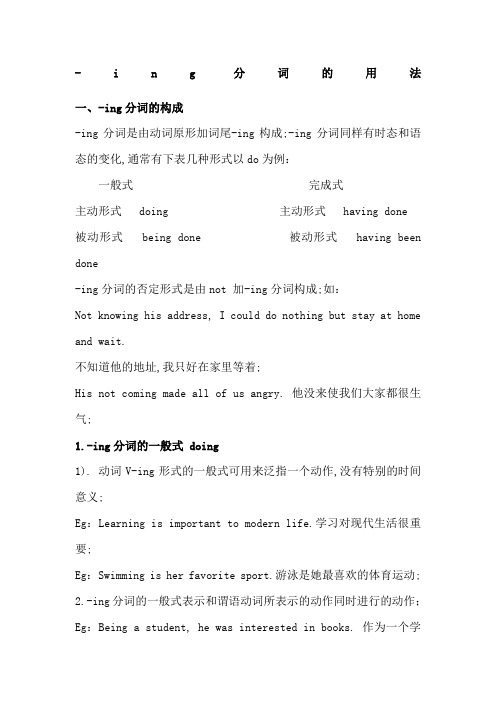ing形式的被动式
动词 ing

5. I noticed that some people were taken to the police station.
I noticed some people being taken to the police station.
Exercise
句型转换(改成带 形式被动结构的简单句) 句型转换 改成带-ing形式被动结构的简单句 改成带 形式被动结构的简单句 1. The hotel which is being built now beside the park was designed by a group of young men.
动词的-ing形式 形式 动词的 熟读深思 熟读以下各句, 注意划线部分, 并思考: 熟读以下各句 注意划线部分 并思考: 动词-ing有哪几种构成形式? 有哪几种构成形式? △动词 有哪几种构成形式 动词-ing在句中可作哪些句子成分? 在句中可作哪些句子成分? △动词 在句中可作哪些句子成分 动词-ing形式还像谓语动词一样可以 △动词 形式还像谓语动词一样可以 带宾语或状语吗? 带宾语或状语吗?
The whole classroom having been cleaned, the students went home happily.
3. 在want、need、deserve、require、repay、 、 、 、 、 、 bear、take等动词及形容词 等动词及形容词worth后,习惯用动 、 等动词及形容词 后 的主动形式表示被动意义, 词-ing的主动形式表示被动意义,相当于“to be 的主动形式表示被动意义 相当于“ done"。如: 。 The house wants cleaning.这房屋需要打扫。 .这房屋需要打扫。 My watch needs repairing.我的手表需要修理。 .我的手表需要修理。 The way deserves mentioning. . 这个方法值得一提。 这个方法值得一提。 These young trees will require looking after carefully.这些小树需要细心照顾。 .这些小树需要细心照顾。 The film is worth seeing. . 这部影片值得一看。 这部影片值得一看。
动词ing的被动形式

动词-ing形式包括现在分词和动名词两种形式,因而其被动结构也有这两种形式。
从时态上讲,动词-ing形式的被动语态有一般式和完成式两种,即being done和having been done.动名词的被动形式在句中可作主语、宾语、表语、定语、和宾补;现在分词的被动形式在句中可作宾补、定语、表语和状语。
一,动词-ing形式的一般式和完成式1.一般式表示一个被动的动作正在进行或与谓语动词所表示的动作同时发生。
That building being repaired is our library. 正在维修的那座大楼是我们的图书馆。
She insisted on being given the hardest work. 她坚持被派给最艰苦的工作。
2.完成式表示的动作发生在谓语动词所表示的动作之前。
Having bee invited, Mr Li went there to make a speech though he was busy.被邀请后,李先生尽管很忙,还是去了那儿做了演讲。
I appreciated having been given the chance to study abroad two years ago.我非常感谢两年前获得了去国外学习的机会。
二,动词-ing形式被动式的否定形式,是在其前面加not.He was unhappy for not having been invited to the party.没有被邀请参加聚会,他感到很不高兴。
三,动名词的被动形式1.当动名词的逻辑主语是这个动名词所表示的动作的承受者时,动名词一般要用被动形式。
Being exposed to the nuclear radiation for long will do great harm to one’s health.长时间暴露在核辐射下会对人体健康造成很大的伤害。
The girl was annoyed by being left alone.让她一个人待着,这个女孩很恼火。
英语v-ing的用法

v-ing的用法一、概念1、v-ing形式的种类功用和各种形式:V-ing 包括动名词和现在分词两种,分别可作:主语、宾语、表语; (动名词)定语、状语、宾/主语补足语(现在分词)注意:其否定形式是在其前边加:not/never.其各种形式如下表:2. V-ing形式的被动式用法及种类当v-in g与它的逻辑主语构成被动关系时,要用其被动式, v-ing的被动式有两种:一般被动式:being done;完成被动式:having been done; V-ing形式的被动式包括动名词被动式和现在分词的被动式两种。
二、知识重点考点/易错点1(一)动名词的被动式动名词的被动式在句中可作主语、宾语、表语,且在句中只表被动,不表进行。
1、作主语So being killed by sharks was a common thing. 因此被鲨鱼吃掉是常有的事。
Being laughed at in public is a terrible thing.在公共场合下被嘲笑是件可怕的事。
Being exposed to the sun does harm to health.暴漏在阳光下对身体有害。
The president’s being killed led to serious consequences.总统被杀导致了严重后果。
2、作宾语V-ing形式的被动式既可作动词的宾语, 也可作介词的宾语。
He was afraid of _________________ (abandon) by us.He did it without ___________ (ask) You can’t eat anything before _____________(operate on)I remember having been told thestory.3、作表语What worried the child most was his not being allowed to visit his mother in the hospital.使孩子最为担心的是他不被允许到医院看母亲。
动词ing形式

动词ing形式动词的-ing形式动词的-ing形式包括传统语法的“动名词”(gerund)和“现在分词”(present participle)两个部分。
动词的-ing形式具有动词的特征,同时又具有名词、形容词和副词的特征,因此它可以在句中作主语、表语、定语、宾语、宾语补足语和状语。
一、动词-ing形式的特征和种类与动词不定式一样,动词的-ing形式也具有动词的特征,有时态和语态的变化,并可带状语、宾语等。
1动词-ing形式的一般式(1.) 动词-ing形式的一般式可用来泛指一个动作,没有特别的时间意义。
Swimming is her favorite sport.游泳是她最喜欢的体育运动。
Learning is important to modern life.学习对现代生活很重要。
His hobby is collecting stamps.他的爱好是集邮。
Her job is keeping the lecture hall as clean as possible.她的工作是尽量使报告厅保持干净。
They prefer staying indoors when the weather is cold.天冷时他们喜欢呆在室内。
(泛指)(2.) 动词-ing形式的一般式可用来表示和谓语动词同时发生的动作。
They went out of the classroom, talking and laughing.他们有说有笑地走出教室。
She listened carefully to her neighbours speaking.她倾听她邻居的讲话。
He saw a girl getting on the car.他看见一个女孩在上汽车。
(She was getting on the car.)He lay on the grass, staring at the sky for a long time.他躺在草地上,长时间地望着天空。
现在分词

②在(be)worth后面只能用动名词的主动态 ) 来表示被动意义。 His suggestion is worth considering. The book is worth reading. ③在allow,advise,forbid,permit等动词后 , , , 等动词后 直接跟动名词形式作宾语, 直接跟动名词形式作宾语,如果后面有名词或代 词作宾语,其后用动词不定式作宾语补足语。 词作宾语,其后用动词不定式作宾语补足语。如: We don’t allow smoking here. ’ We don’t allow students to smoke. ’
talking It is a waste of time ___________ (talk) to
him .
to learn It is important for me _______________
(learn) Englithe exam will disappoint your parents. A. You failing B. Your failing C. You fail D. You to fail. 2. _____ the same mistake again made his parents very angry. A. His being made B. He has made C. He had making D. His making 3. I don't think it's much good _____ to him. A. writing B. to write C. write D. written 4. Such books are not worthy _____ at all. A. of being read B. being read C. reading D. to read 5.It is no use ________ without through _________. A. to read; understood B. reading; understanding C. to read; understand D. read; to understand
动词ing的被动语态

动词i n g的被动语态集团文件版本号:(M928-T898-M248-WU2669-I2896-DQ586-M1988)动词i n g形式的被动结构动词ing形式包括动名词和现在分词两种形式,因而其被动结构也有这两种形式。
一、动名词的被动语态1.当动名词逻辑上的主语是动名词所表示的动作的对象时,动名词一般要用它的被动式。
He can't stand being laughed at. 他忍受不了被别人嘲笑。
So being killed by sharks was a common occurrence. 因此那时给鲨鱼吃掉是常有的事。
2.动名词的主动形式表被动含义(1)在want,need,require,deserve等动词后,常用动名词的主动形式表达被动含义。
The radio needs repairing.=The radio needs to be repaired. 这台收音机需要修理了。
(2)be worth后常跟动名词的主动形式表达被动含义。
The book is worth reading again.=The book is worthy of being read again. 这本书值得再读一遍。
My pen needs filling. 我的笔该上墨水了The point deserves mentioning. 这一点值得提一下二、现在分词的被动语态其构成为being/having been+过去分词。
如果现在分词所表示的动作与其逻辑主语之间是被动关系,则应用现在分词的被动形式。
The building being built is our library. 正在被建的这座楼是我们的图书馆。
Having been given the good chance,how could I give it up?既然给了这么好的机会,我又怎么能放弃?注意:当分词所表示的动作与谓语表示的动作同时发生或正在进行,则用being+过去分词;当分词所表示的动作在谓语表示的动作之前发生则用having been+过去分词。
英语语法动词-ing

• 注:下面几种情况多用不定式作宾语: • a. 当start, begin本身用于进行时态时。 • When the teacher came into the room, he was starting to write to his parents. • b. 当start, begin后接表示心理活动的动词时。 • Hearing the news, he started to think of a good way to solve the problem. • c. 当句子的主语是无生命的东西时。 • We were about to leave when it began to rain.
6) 动词-ing作补语:
• ①动词-ing可以在see, hear, notice, watch, feel, look at, listen to, observe, have, get, leave, keep, set, catch, find等动词后面和一个名词或代 词构成一个复合宾语,作宾语补语。如: • I noticed a man running out of the bank when I got off the car. • Last night the shopkeeper caught a child stealing some food in the shop. • ②上面这类句子也可变成被动语态,这时,动词 -ing可看成是主语补语。如: • We were kept waiting for quite a long time. • Lily was never heard singing that song again.
• 5. 有些动词既能接不定式,又能接动词-ing, 含义有所不同。如: • ①forget, remember, regret等如: • Do you remember seeing me before? 你记 得以前见过我吗? • Remember to lock the door when you leave. 离开时要记得锁门。
动词ing形式的被动语态

taken to the school library. 被动,完成
单句改错
1. Having not seen the film, I can’t tell you Not having
what I think of it.
2. Generally speak, facial expressions are speaking
3…,they also express their feelings using unspoken language through physical distance…
V-ing 形式
V-ing 形式由 “do+ing” 构成, 其否定形式是 “not doing”, V-ing 可以带宾语或状语构成 V-ing 短 语,没有人称和数的变化,但有 时态和语态的变化。
The blackboard needs cleaning. = The blackboard needs to be cleaned.
黑板需要擦干净。
The broken window wants repairing. • = The broken window wants to be repaired. • 那个破窗户需要修理。
• 一,读一读,想一想: • He hurried home, looking behind from time to
time. • The problem being discussed now is very
important. • Having heard this , our teacher expressed her
2. Having lived in this city for three years, she knows it very well.
动词ing形式的被动式

动词-ing形式的被动式在上个单元我们学习了动词不定式的被动式,今天我们一起来学习动词-ing形式的被动式。
[看一看] 请看下列句子,看看动词-ing形式的被动式在各句中作什么成分。
1. So being killed by sharks was a common occurrence.2. He didn’t mind being left at home.3. That building being repaired is our library.4. Being protected by a thick wall, they felt they were quite safe.5. Having been given such a good chance, how could she let it slip away?[讲一讲]动词-ing形式的被动式在句中可以作主语(如句1)、作宾语(如句2)、作定语(如句3)、作状语(如句4和句5)。
此外,动词-ing形式的被动式还可以在句中构成复合宾语。
如:You’ll find the topic being discussed e verywhere.你会听到到处都在讨论这个问题。
He often watched the boats being unloaded.他常常看轮船卸货。
As we approached the village we saw new houses being built.走近村子时我们看到正在盖新房。
此外,在want, need, deserve, require等动词后,尽管表示的是被动含义,我们却用动词-ing形式。
如:My pen needs filling. 我的笔该上墨水了。
The point deserves mentioning.这点值得提一下。
This problem requires studying with great care.这问题需要仔细研究。
动词ing形式的被动式和过去分词的区别

学习必备欢迎下载动词-ing形式的被动式和过去分词的区别动词-ing形式被动式在句中作主语、宾语、表语、定语、补足语、状语。
其中作主语、宾语、表语的动词-ing形式的被动式为动名词的被动式,作定语、补足语和状语的动词-ing形式的被动式为现在分词的被动式。
动词-ing 形式的被动式有一般式(being+过去分词)和完成式(having been+过去分词)两种,过去分词只有一般式,具体区别如下:一、作定语1、现在分词被动式作定语例:1)The problem being discussed is of great importance.正在讨论的问题很重要。
2)They don’t like the design of the new bridge being built.他们不喜欢正在建造的桥的设计。
注:现在分词的被动式一般式表示这个被动的动作正在进行,完成式一般在句子中作状语(偶尔作非限制性定语),不作其它成分。
2、过去分词作定语例:1)You should improve your spoken English.你应该提高你的英语口语水平。
2)When we arrived, we were given printed question papers.当我们到达时,就拿到了印制好的试卷。
3)Is this the book recommended by the teacher?这是老师介绍的书吗?4)an escaped prisoner一个逃跑了的犯人5)the risen sun升起的太阳6)The excited boys couldn’t help shouting at the exciting news.激动的男孩们听到这令人兴奋的消息时忍不住大声叫喊。
7)The exhausted men sat down to rest under the shade of a tree.那些感到精疲力竭的人坐在树荫下休息。
高二英语动词ing用法归类总结

-i n g分词的用法一、-ing分词的构成-ing分词是由动词原形加词尾-ing构成;-ing分词同样有时态和语态的变化,通常有下表几种形式以do为例:一般式完成式主动形式 doing 主动形式 having done被动形式 being done 被动形式 having been done-ing分词的否定形式是由not 加-ing分词构成;如:Not knowing his address, I could do nothing but stay at home and wait.不知道他的地址,我只好在家里等着;His not coming made all of us angry. 他没来使我们大家都很生气;1.-ing分词的一般式 doing1). 动词V-ing形式的一般式可用来泛指一个动作,没有特别的时间意义;Eg:Learning is important to modern life.学习对现代生活很重要;Eg:Swimming is her favorite sport.游泳是她最喜欢的体育运动;2.-ing分词的一般式表示和谓语动词所表示的动作同时进行的动作;Eg:Being a student, he was interested in books. 作为一个学生,他对书本很感兴趣;Eg:They went out of the classroom, talking and laughing. 他们有说有笑地走出教室;2.-ing分词完成式 having done:完成式表示动作在谓语动词所表示的动作之前发生的动作;Eg:Not having studied his lessons very hard, he failed the examinations. 因为没有努力学习功课,他考试不及格;Eg:Having answered the letter, she went on to read an English novel.Eg:Having lived in this city for three years, she knows it very well.3. -ing分词的被动式 being done :-ing分词的被动式表示它的逻辑主语是-ing分词动作的承受者;被动语态-ing一般式所表示的动作是一个正在进行中的被动动作. Eg:The question being discussed is very important. 正在被讨论的问题很重要;4. having done的被动形式having been done表示它的逻辑主语是动词-ing形式表示的动作的承受者;表示动作在谓语表示的动作之前发生;Eg:Having been criticized by the teacher, he gave up smoking. 被老师批评以后,他把烟戒了;Eg:Having been shown the lab, we were taken to see the schoollibrary.在被带去看了实验室之后,我们又被带去参观校图书馆;5动词-ing形式的否定形式;动词-ing形式的否定形式通常是在其前加not,带有逻辑主语时not 应放在动词-ing形式之前;Eg:Excuse me for my not coming on time.Eg:I’m sorry for not having kept my promise.例1. ______ to the station on time made everyone wor ried last week.A. Him not gettingB. Not his gettingC. His not gettingD. Not getting6.动词-ing形式的复合结构动词ing形式的复合结构由形容词性物主代词或人称代词宾格,名词所有格或普通格加动名词,动名词的复合结构实际上是给动名词加了一个逻辑主语; 动词-ing形式的复合结构有四种形式:①形容词性物主代词+动名词②名词‘s +动名词③代词宾格+动名词④名词+动名词注意动名词的复合结构可在句中作主语或宾语;作主语时,不能用③④两种形式;Eg:Tom’s winning the first prize last year impressed me a lot. 汤姆去年得了一等奖使我印象深刻;Eg:Do you mind my/me/Jack’s/Jack leaving now.翻译练习:His coming made us very happy. 他的到来使我们大家都很高;翻译练习:He was awakened by someone’s knocking at the door. 他被某人的敲门声吵醒了;二 -ing分词的语法作用动词-ing一方面具有动词的性质,另一方面也相当于一个名词或形容词、副词,在句中可以作主语、表语、宾语、定语、状语和补语等; 1–ing分词短语作主语: 动词ing形式作主语往往表示经常性、习惯性的动作,谓语动词用单数:Eg:Reading books widens our knowledge.读书增长我们的知识Eg:Saying is easier than doing. 说比做容易;翻译练习:Learning English well is not easy.在下面两种结构中,-ing分词也作主语;A.It is no use/no good/useless/worthwhile/dangerous/a wa ste of time /fun等后需用动名词作真正的主语;为了保持句子平衡,通常用it 作形式主语,而把真实主语放在句末;Eg:It is no use crying over spilt milk. 覆水难收Eg:It's a waste of time arguing about it. 辩论这事是浪费时间;翻译练习:It is no use waiting for him any longer.B.当句型“There is no doing…”表示“不允许、禁止某种行为的发生或存在”时,需用动名词作主语;Eg:There is no joking about such matters. 这种事开不得玩笑;There is no point indoing sth 干…….没意义; Eg:There’s no point in waiting. 等待是毫无意义的; There is no senseindoing sth. 干…没道理/意义例.1.In my mind,_____ that famous university will be the only way to become a worlds-class writer. A. attending B.to attend C. attendD. having attended2. My grandfather is a millionaire, but _____ money does not solve all his problem.A. hasB. to haveC. havingD. having had2 -ing分词短语作表语:Eg:His hobby is collecting stamps. 他的爱好是收集邮票; Eg:The problem is quite puzzling. 这个问题很令人困惑;3 -ing分词作宾语:①–ing分词可作动词宾语, 作动词的宾语;mind介意, suggest建议, enjoy欣赏,, admit承认, appreciate 感激,欣赏, avoid避免, delay推迟, dislike不喜欢,厌恶, escape 逃脱, finish完成, forgive宽恕, imagine想象, keep保持, miss 错过, practise训练, resist抵抗,抵制, risk冒险, deny拒绝,否认, consider考虑等;Eg:I suggest doing it in a different way. 我建议用另一种方法做这件事;Eg:We enjoy attending Miss Li''s class. 我们喜欢听李老师的课;例1:He got well-prepared for the job interview, for he couldn’t risk _____ the good opportunity.A. to loseB. losingC. to be lostD. being lost答案B.后risk 后接动名词,he与 lose是主谓关系;2:Bill suggested _____ a meeting on what to do for the Shanghai Expo during the vacation.A. having heldB. to holdC. holdingD. hold3.To improve your spoken English, you should practic e_____ it every day. A. speak B. to be spo ken C. speaking D. to speak②-ing分词作宾补,也可用在复合宾语中作真正的宾语,而用it作形式宾语;如:Eg:I don’t think it possible living in such a cold place. 我认为住在这么寒冷的地方是不可能的;Eg:Do you consider it any good trying again 你觉得再试一次会有好处吗③-ing分词作介词宾语,经常用在一些短语的后面;如:Eg:I'm against inviting him to dinner. 我反对邀请他来吃饭; Eg:They don’t feel like walking that much. 他们不喜欢走那么多路;翻译练习:Don’t be afraid of speaking English.不要害怕说英语;此类短语还有很多;如:can’t help忍不住be proud of以……自豪, be responsible for对……负责, insist on坚持, keep on 继续think of考虑,想到, dream of梦想, hear of听说, prevent…from防止,阻止, keep…from防止,阻止, stop…from防止,阻止, be engaged in从事于, depend on依靠,依赖, thank…for因……而道谢, excuse…for因……而道歉, aim at目的在于, set about着手做, be fond of喜欢, be afraid of害怕, be tired of对……厌烦, succeed in成功地做……, be interested in对……感兴趣, be ashamed of对……感到羞愧, put off推迟, give up放弃, be worth值得做……, be busy in doing sth 忙于做某事 ,等等;注意:在有些句子中,介词常可省去;如:Eg:I have no difficulty in communicating with foreigners. 我在和外国人交谈方面没有什么困难;Eg:What can prevent us from getting married 有什么能阻止我们结婚翻译练习: Farmers were busy in getting in the crops. 农民在忙着收庄稼;翻译练习: I have never dreamed of visiting that place. 我从未梦想过要参观那个地方翻译练习: He used to spend a lot of time in playing games. 过去他常花很多时间玩游戏;例1.The girl said that she had never dream of _____a volunteer.A. beB. to beC. beingD. is2. I had great difficulty _____ the suitable food on the menu in that restaurant.A. findB. foundC. to findD. finding3. Seeing the funny scene, I can’t help______.A. laughB. to laughC. laughingD. laughed另外,-ing分词可以和一些介词如in, on, after, against, before, by, for, without, besides等构成短语,在句中作状语;如:Eg:He left ahead of time without saying a word. 他一句话也没说就提前离开了;Eg:Besides cooking and sewing, she had to take care of four children.除了做饭和缝纫以外,她还要照顾四个孩子;Eg:On hearing the news, all the pupils jumped with joy. 一听到这个消息后,所有的学生都高兴得跳了起来;4 -ing分词作定语:①单个的分词作定语一般放在被修饰词的前面,–ing分词作定语可用来说明被修饰的名词的用途和性能;如:reading material 阅读材料 walking stick 手杖 fishing pole 鱼杆flying suit 飞行服 writing table 写字台 listening practice 听力训练reading room 阅览室 swimming pool 游泳池 dining car 餐车sleeping car 卧车 singing competition 歌咏比赛 waiting room 候车室②-ing分词作定语还可以表示所修饰的人或物的动作或状态,在意思上接近一个定语从句,可以表示正在进行的动作,也可表示经常性动作或当时的状态;如:developing countries = countries that are developing 发展中国家a growing city = a city that is growing 发展着的城市Eg:Who is the student standing by the door 站在门边的同学是谁Eg:They lived in a house facing south.=They lived in a house which faces south. 他们住在一所朝南的房子里;翻译练习:坐在我旁边的女孩是我妹妹;The girl sitting beside me is my sister.翻译练习:有人在敲门There is someone knocking at the door.③–ing分词还可以作非限制性定语,相当于一个非限制性定语从句,常用逗号和句子其它部分分开;如:Eg:When she appeared, John, wearing a dirty and worn-out overcoat, ran to her with joy. 当她出现的时候,约翰穿着一件又脏又破的大衣高兴地跑了过去;5 -ing分词做状语:动词-ing形式作状语可以修饰谓语动词或整个句子,可以表示时间、原因、结果、条件、让步、方式或伴随情况等;①.表示时间:-ing分词短语作时间状语,相当于一个时间状语从句,有时可由连词when, while引出;Eg:Turning around, she saw a car driving up.=When she turned around, she saw a car driving up. 她转过身,看见一辆车朝她开来;Eg:While reading the book, he nodded from time to time. 他一边看书,一边不时地点头;翻译练习:看到那些画,他想起了她的童年;Seeing those pictures, she remembered her childhood.翻译练习: 听到这消息时我们高兴地跳了起来;Hearing the news, we jumped with joy.②表示原因:-ing分词短语作原因状语,相当于一个原因状语从句;Eg:Being tired, he could not walk any further.=As he wastired, he could not walk any further. 因为疲倦,他不能再往前走了;Eg:Not knowing his address, I can’t send this book to him. 因为不知道他的地址,我不能把这本书送给他;Eg:Many of us, being so excited, couldn’t go to sleep that night. 因为非常激动,那晚我们许多人都没睡着;翻译练习:因为不知道路,他无法到那里去;Not knowing the way, he could’t go there.翻译练习:因为激动他睡不着;Being excited , she couldn’t go to sleep.③表示结果:–ing分词短语作结果状语;表示一种必然的结果,可扩展为一个含有并列谓语的简单句;The fire lasted nearly a month, leaving nothing v aluable.=The fire lasted nearly a month, and left nothing valuable. 大火持续了近一个月,几乎没剩下什么值钱的东西; Eg:His father died, leaving him a lot of money. 他父亲死了,留给他许多钱;Eg:She was so angry that she threw the toy on the ground, breaking it into pieces.她非常生气,把玩具扔在地上,把它摔成了碎片;④表示伴随.-ing分词作伴随状语,可以放在句子的前面、后面或中间,表示主语的另一个、较次要的动作;如:Eg:I stood by the door, not daring to say a word.=I stood by the door, and did not dare to say a word. 我站在门旁,不敢说一句话;Eg:They stood there for half an hour,watching the stars in the sky. 他们在那儿站了半小时,观察着天上的星星;翻译练习:年轻人跟在老人的后面开始慢慢地走起来;Following the old man, the young people started walking slowly. 翻译练习:他们在那儿站了一个小时观看比赛;They stood there for an hour watching the game.⑤表示条件:动词-ing形式作条件状语,相当于一个条件状语从句;Being more careful, you can make fewer mistakes.=If you are more careful, you can make fewer mis takes. 更细心点,你就会少犯错误;Turning to the left, you ‘ll see the tower.向左转,你就会看到那座塔;翻译练习:如果努力,你就会成功;Working hard, you will succeed.⑥“with/without+名词普通格或代词宾格+-ing分词”结构在句中作状语,表示伴随情况或时间、原因等;如:Eg:His hair became gray with the years passing. 随着时间的推移,他的头发变花白了;Eg:Without anyone noticing, he slipped through the window. 没人注意,他从窗户溜了出去;例1.The storm left, ______ a lot of damage to this area.A. causedB. to have causedC. to causedD. having caused例2.----“You can’t catch me” Janet shouted, ______ away.A. runB. runningC. to runD. ran 例3.It’s necessary to be prepared for a job interview. ______ the answers ready will be of great help.A. To have hadB. Having hadC. HaveD. Having 例 4._____ from other continents for millions of years, Australia has many plants and animals not found in any other country in the world.A. Being separatedB. Having separatedC. Having been separatedD. To be separated例5.Daddy didn’t mind what we were doing, as long as we were together, _____ fun.A. hadB. haveC. to haveD. having 例6.Oil prices have risen by 32 percent since the start of the year, _____ a record $57.65 a barrel on April 4.A. have reachedB. reachingC. to reachD. to be reaching例7.It was unbelievable that the fans waited outside the gym for three hours just _____ a look at the sports stars.A. hadB. havingC. to haveD. have例8._____ more about university course, call 9207463789. A. To find out B. Finding out C. Find out D. Having found out简析:1.D.结果状语,时间有明显先后之分;2.B.伴随状语;3.D.条件状语,有明显时间先后之分;4.C.原因状语,时间有明显先后之分;5.D.伴随状语;6.B.结果状语;7.C.作目的状语;8.A.作目的状语;6 -ing分词作补语:--ing分词可以在see, hear, notice, watch, feel, look at, listen to, observe, have, get, leave, keep, set, catch, find等动词后面和一个名词或代词构成一个复合宾语,作宾语补语;如:Eg:I noticed a man running out of the bank when I got off the car.我下车的时候注意到一个男人匆匆忙忙地从银行里跑出来;Eg:Last night the shopkeeper caught a child stealing some food in the shop.昨晚,店主在商店里抓到一个小孩在偷东西;翻译练习:I saw him going upstairs.我看见他正在上楼;翻译练习:We watched her crossing the street. 我们看着她穿过大街;三. –ing分词作主语和表语时与不定式的区别:1、-ing分词和动词不定式作主语和表语的主要区别在于:在表示比较抽象的一般的多次性行为时多用-ing分词;在表示具体的或一次性的动作,特别是将来的动作时,多用不定式;如:Eg:Smoking is forbidden here. 泛指吸烟这里禁止吸烟;Eg:It’s not good for you to smoke so much. 指你吸烟吸这么多烟对你的身体不好;2、有些动词既能接不定式,又能接-ing分词,含义有所不同;如:Remember doing sth 记得做了某事Remember to do sth 记住要去做某事Forget doing sth 忘记做了某事Forget to do sth 忘记要去做某事Regret doing sth 后悔做了某事Regret to do sth 遗憾要去做某事Mean to do sth 打算做某事Mean doing sth意味着做某事Stop to do sth 停下来去做某事Stop doing sth 停止做某事Try to do sth 努力/企图做某事Try doing sth 试着做某事Eg:Do you remember seeing me before 你记得以前见过我吗Eg:Remember to lock the door when you leave. 离开时要记得锁门;Eg:I try not to think about that. 我尽量不去想那件事;Eg:Would you please try doing that again 请你再试一次好吗Eg:I mean to change it for another one. 我想换成另外一个; 翻译练习:Having finished the exercises, we went on to learn the new words in the next unit.做完练习以后,我们继续学习下一单元的单词;翻译练习:After a short rest, they went on working. 短暂地休息以后,他们又继续工作;翻译练习:Missing the train means waiting for another hour. 错过这班车就意味着再等一个小时;例 1. Never mind. Please try _____ the problem in another way.A. solveB. to solveC. being solvedD. solving例2. When asked by the police, he said that he remembered _____ at the party, but not _______.A. to arrive, leavingB. to arrive, to leaveC. arriving, leavingD. arriving, to leave答案 C.记得来过晚会,用arriving,但是后的动作仍然记得,用leaving.3、动词allow, advise, forbid, permit等可直接跟-ing分词作宾语,不可以接动词不定式作宾语,但可接不定式作宾语补语;如:Eg:We don’t permit smoking here. 我们这儿不允许吸烟;Eg:Please permit me to say a few words. 请允许我说几句话; 例1.---Can I smoke here----Sorry. We don’t allow_____ here.A. people smokingB. people smokeC. to s mokeD. smoking4、动词need, require, want作“需要”解时以及deserve作“值得”解时,后面接-ing分词或不定式的被动式;need / want/require/deserve doing=need/want/require/dese rve to be done Eg:The lake needs repairing/ to be repairedEg:These little children require looking after carefully/to be looked after carefully. 这些小孩需要细心地照料;翻译练习:Your shoes need cleaning/ to be cleaned. 你的鞋需要清洗一下了;翻译练习:The room wants cleaning/to be cleaned. 这个房间需要打扫;例:As a result of the serious flood, two-third of the buildings in the area______.A. need repairingB. needs to repairC. needs repairingD. need to repair5、动词like, hate, prefer等后面,如表示一般性动作,多用-ing 分词;如指特定的具体的某次动作,多用不定式;如:Eg:I like swimming, but I don’t like to swim with you. 我喜欢游泳,但我不喜欢和你一起游泳;Eg:I prefer walking to school every day. 我情愿每天步行去学校;Eg:I prefer to stay at home today. 今天我情愿呆在家里;6、-ing分词作表语的两种不同含义:①-ing分词作表语可以表示主语的内容是什么;Eg:Their job is building houses. 他们的工作是盖房子;Eg:The real question is getting to know the needs of the people. 真正的问题是了解人民的需要;②-ing分词作表语还可以表示主语所具有的特征;如:Eg:This story is very interesting. 这故事很有趣;Eg:The problem is quite puzzling. 这个问题很令人困惑;7、不定式和-ing分词作宾语补语的区别:在see, hear, feel, watch, notice等感官动词后,既可用-ing分词构成复合宾语,也可用不定式构成复合宾语,两者之间有一定的区别;用-ing分词时,表示动作正在进行;用不定式时,表示动作发生了,即动作的全过程结束了;如:Eg:Do you hear someone knocking at the door Someone isknocking at the door. 有人在敲门你听见了吗Eg:Do you hear someone knock at the door Someone knocked at the door just now. 你听见有人敲门了吗8、高中阶段常见的带介词to的短语,后接-ing分词或名词;如:look forward to渴望,盼望admit to承认, contribute to捐助、贡献, get down to着手做, give way to让位于,keep to 坚持、遵守, lead to 导致, take to从事, turn to 求助于, stick to忠于、坚持, point to指向、表明, see to 注意、处理, be used to 习惯于, devote oneself to 献身于, be equal to 胜任的、等于, be familiar to 为……熟悉be/get used to习惯于 object to反对,抗议pay attention to注意 .9、高中阶段有一些固定的-ing分词短语,如:generally speaking 一般来说, judging from…根据……来判断, considering…考虑到……, talking of…谈到……,提到……, supposing…假如……等,它们的逻辑主语和句子的主语不一致;这种短语可以被称之为句子的状语,也可当作一个插入语;如:Eg:Judging from his accent, he must come from Canada. 从他的口音看他一定来自加拿大;Eg:Considering how poor he was, we decided to let him attend the concert for free.考虑到他是多么的穷,我们决定让他免费听音乐会;Exercises:1. The officers narrowly escaped ___________in the hot battle.A. have killedB. to killC. to be killedD. being killed2.___________ the letter, he went out to post it.A. WritingB. Being writingC. Having writtenD. Written3. Don't you remember ___________A. seeing the man beforeB. to see the man beforeC. saw the man beforeD. to have seen the man before4. People couldn't help ___________ the foolish emperor in the procession.A. laugh atB. to laugh atC. laughing atD. laughing on5. We're looking forward ___________ the photo exhibition.A. to visitingB. to visitC. to having visitedD. visiting6. The girl ___________ under that tree is my sister.A. sittingB. sitsC. is sittingD. sat7. This sentence needs ___________ .A. a improvementB. improveC. improvingD. improved8. ___________ anything about the accident, he went to work as usual..A. Not knownB. Known notC. Knowing notD. Not knowing9. The next morning she found the man ___________ in bed, dead.A. lyingB. lieC. layD. laying10. There was terrible noise ___________ the sudden burst oflight.A. followedB. followingC. to be followedD. being followed11. The secretary worked late into the night, ___________ a long speech for the president.A. to prepareB. preparingC. preparedD. was preparing12. "Can't you read " Mary said ___________ to the notice.A. angrily pointingB. and point angrilyC. angrily pointedD. and angrily pointing13. How about two of us ___________ a walk down the gardenA. to takeB. takeC. takingD. to be taking14. ---I must apologize for ___________ahead of time. ---That's all right.A. letting you not knowB. not letting you knowC. letting you know notD. letting not you know15. ---You were brave enough to raise objections at the meeting. ---Well, now I regret ___________ that.A. to doB. to be doingC. to have doneD. having done16. Would you ___________ me your identification card, sirA. mind to showB. mind showingC. trouble to showD. trouble showing17. He suggested ___________ on Saturday.A. to have a meetingB. having a meetingC. a meeting to haveD. that having a meeting18. It is no good ___________ to come now. He is busy.A. if you ask himB. to ask himC. asking himD. that you ask him19. Although punctual himself, the professor was quite used ___________ late for his lecture.A. to have studentsB. for students to beC. for students' beingD. to students' being20. He dressed himself quickly and ___________ his schoolbag, went to school.A. carriedB. to carryC. carryingD. carries21. ___________ for several weeks, the city needed food.A. As having floodedB. being floodedC. Having been floodedD. To flood22. ___________ ill worried my parents greatly.A. I fellB. Me fallingC. My fallingD. I falling23. She is writing a letter to a friend of hers, ___________ him to attend the meeting.A. having invitedB. invitingC. to inviteD. invited24. Our town has dozens of factories, ___________several saw mills.A. includedB. are includingC. are includedD. including25. ___________ the classroom, the students went to theplayground to watch the football match.A. To cleanB. Having cleanedC. CleanedD. Cleaning语法专项练习二1.北京 ________in the queue for half an hour, Tom suddenlyrealized that he had left his wallet at home.A. To waitB. Have waitedC. Having waitedD. To have waited2.上海 According to a recent U.S. survey, children spent up to25 hours a week ______TV.A. to watchB. to watchC. watchingD. watch3.上海 The flu is believed _______ be viruses that like toreproduce in the cells inside the human nose and throat.A. causingB. being causedC. to be causedD. to have caused4.上海 The flowers ______ sweet in the botanic garden attractthe visitors to the beauty of nature.A. to smellB. smellingC. smeltD. to be smelt5.天津 Don’t leave the water ______ while you brush your teeth.A. runB. runningC.being run D. to run6.重庆 They see you as something of a worrier, ______ problemswhich don’t exist and crossing bridges long before you cometo them.A. settlingB. discoveringC.seeing D. designing7.福建The news reporters hurried to the airport, only ______the film stars had left.A. to tellB. to be toldC.telling D. told8.湖南 You were silly not _____ your car.A. to lockB. to have lockedC. lockingD. having locked9.江苏 The man insisted _______ a taxi for me even though I toldhim I lived nearby.A. findB. to findC. onfinding D. in finding10.江苏 The old man, _______ abroad for twenty years, is on theway back to his motherland.A. to workB. workingC. to haveworked D. having worked1-5 D C A C D6---10 A C D A B 11---15 B A C B D 16---20 B B C D C 21---25 C C B D B 1—10 CCCBB CBBCD。
动词ing形式的用法及练习题(归纳整理,含答案)

Make them easier for you to remember ! 避免 错过 少延期 avoid miss put off/ postpone
建议 完成 多练习 suggest finish
喜欢 想像 禁不住 enjoy 承认 否定 与嫉妒 admit 逃避 冒险 莫原谅 escape 忍受 保持 不介意 stand deny risk keep
区别 see sb. doing sth 是指”看见某人正在做某事”,不是全 过程,表正在进行 see sb. do sth 是指”看见某人做过某事”是看着事情的 发生全过程, 是看见某人做某事 例句 I saw her clean the classroom. 是说我看到她打扫教室了。(强调做过这件事) I saw her cleaning the classroom. 我看到她正在扫打教室(强调正在做某事)
The test finished, we began our holiday. = When the test was finished, we began our holiday. The meeting gone over, everyone tired to go home earlier. 独立主格结构可在其前加上介词 with/without。 Without a word more spoken, she left the meeting room. The boy was walking, with his father following.
【分析】此题很容易误选B,汉子你一不小心就会认 为它是定语从句,whose 在定语从句中用作定语修饰 其后的名词owner。但它却不是一个句子,因为没有 谓语。seat 用作动词时,它总是及物的,其后要么接 宾语,要么它就用于被动语态,所以若在 seated 前加 上助动词is,则可以选择B。所以选A。
现在分词

• 3)作宾语补足语 • a.表示感觉和心理状态的动词,如hear, feel,find,listen to,look at,watch, notice,observe,smell,see等词的宾语 可以用现在分词作宾语补足语。例如: • I noticed him slipping away before the end of the meeting. • I can smell turkey roasting,and it's making me hungry.
• 注意,当现在分词作让步状语时,一般放 在句首,常常由although,though,even if, unless等连词引入;作结果状语时,一 般放在句末,前面可以加so,thus,hence, thereby等副词。
用法
• 现在分词表示主动的意义; 现在分词表示主动的意义; • 表示一般性的或正在进行的动作; 表示一般性的或正在进行的动作; • 在表现形式上有“一般式”和“完成式” 在表现形式上有“一般式” 完成式” 主动式” 被动式”之分, 与“主动式”和“被动式”之分,
现在分词的作用: 现在分词的作用:
• 4)作状语 • 现在分词作状语表示主语在进行一动作的 同时所进行的另一动作,它对谓语动词起 修饰或陪衬的作用。这时要注意现在分词 与其逻辑主语在时态和意义上的统一。例 如:
• 1.作伴随状语 1.作伴随状语 • 动词stand, sit和lie加现在分词作伴随状语, 加现在分词作伴随状语, 动词 和 加现在分词作伴随状语 表示两个动作同时发生。 表示两个动作同时发生。 • We sat there talking to each other. • The poor man sat by the road, begging. • She sat at a window,reading a book. =She sat at a window and read a book.
doing被动式小结

6. 作宾语补足语: ● You’ll find the topic _b_e_i_n_g_d__is_c_u_s_s_ed
(discuss) everywhere now.
注意 ①在want,need,require,deserve等动词之后 作宾语时,常用动名词的主动式表示被动意义。
Your car needs __f_il_lin_g__(fill). 你这车要充气了。 This city deserves v_i_s_it_in_g_(visit). 这座城市值得光顾一下。
Choose the right answer.
1. At the beginning of class, the noise of desks ____ could be heard outside the classroom. (2007 全国卷II) A. opened and closed B. to be opened and closed C. being opened and closed D. to open and close
4. Being protected by a thick wall, they felt they
were quite safe. 作状语
5. Having been given such a good chance, how
could she let it slip away? 作状语
6.He often watched the boat being unloaded.
2. __ to sunlight for too much time will do harm to one’s skin. (上海2002)
A. Exposed
动词ing形式的被动语态

Unit3 Under the seaPart3 Grammer 金台高中朱丽萍动词-ing形式的被动语态Ⅰ.动词-ing形式的被动语态的构成形式:v.-ing形式的被动形式有一般式和完成式两种形式,即being done 和having been done。
一般式表示一个被动的动作正在进行或与谓语动词的动作同时发生;完成式表示的动作发生在谓语动词所表示的动作之前。
例如:①That building being repaired is our library.正在维修的那座大楼是我们的图书馆。
②I appreciated having been given the chance to study abroad two years ago.我非常感激两年前获得了去国外学习的机会。
Ⅱ.动词-ing形式的被动语态的用法1)作主语①Being punished by the headmaster made Jim unhappy.受到校长的惩罚使吉姆很不高兴。
②It's fun being taken to the zoo.被带去动物园真有意思。
2)作宾语I forget once being taken to the seaside when I was young.我忘了小时候曾被带到海边。
3)作表语What made his parents happy was his being admitted to a famous university.让他父母高兴的是他被名牌大学录取了。
4)作宾语补足语He often watched the boats being unloaded.他常常看轮船卸货。
5)作状语一般式的被动语态强调正在进行的被动动作,而完成式的被动语态则强调被动动作在谓语动词所表示的动作之前已完成。
①Being protected by a thick wall, they felt they were safe.有一堵厚墙掩护着,他们感到很安全。
- 1、下载文档前请自行甄别文档内容的完整性,平台不提供额外的编辑、内容补充、找答案等附加服务。
- 2、"仅部分预览"的文档,不可在线预览部分如存在完整性等问题,可反馈申请退款(可完整预览的文档不适用该条件!)。
- 3、如文档侵犯您的权益,请联系客服反馈,我们会尽快为您处理(人工客服工作时间:9:00-18:30)。
Daily.
•(伴随)
◆ _N__o_t_b_e_in__g_ (be) able to understand English,
he didn’t know what they wanted. •(原因)
◆ _W__o_rk__in_g_ (work) hard, you will succeed. •(条 ◆ _H__a_v_in_g__b_e_e_n_t_a_u_g_h_t_ (teach) many times, 件the)
主动 被动
doing done being done to be done
正在进行 已经完成 正在进行 将要发生
5. 作状语
◆ Hearing the good news, he jumped with jo•(y时.
◆ He sat at the table, _r_e_a_d_i_n_g_ (read) China间)
ing形式的被动式
V-ing 形式
V-ing 包括动名词和现在分词,可作 主语、宾语、表语; 定语、状语、宾语补足语 但不能单独作谓语 其否定形式是 _n_o_t_d_o_in_g___
语态
时态
主动形式
被动形式
一般式 (not) doing (not) being done
完成式
(not) having done
fields are tired. *The problem _b_e_in_g__d_is_c_u_s_s_e_d_ (discuss)
now is very important.
注意:过去分词/Ving被动形式/不定式的 被动形式做定语的区别
去年造好的桥 _t_h_e_b__ri_d_g_e_b__u_il_t_la__st_y_e_a_r__ 正在建造的桥 _t_h_e_b__ri_d_g_e_b__ei_n_g__b_u_il_t_n_o_w_ 将要建造的桥 _t_h_e_b__ri_d_g_e_t_o__b_e_b_u_i_lt__so_o_n_
the sea is a common thing.
2. 作表语 ☆ Teaching is learning. 教学相长。 ☆ My hobby is _m__a_k_in_g__ (make)
model planes. ☆ What worried the child most was
__n_o_t _b_e_in_g__a_ll_o_w_e_d__ (not, allow) to go out to play.
(not) having been done
V-ing 的用法
1.作主语 ★ Swimming is good for health. ★ _R__a_is_i_n_g_____ (raise) your hat to a lady is good manners. ★ _B__e_in_g__k_il_le_d__ (kill) by sharks in
English. ※ It is + adj. / n. + (for sb.) to do sth.
3. 作宾语 (v./ prep.后)
★ The bird escaped _b_e_in_g__c_a_u_g_h_t_ (catch). ★ I feel like __jo_i_n_i_n_g___ (join) the army. ★ He was afraid of _b_e_i_n_g_a_b_a_n_d_o_n_e_d___
boy still didn’t know how to do it. •(让步)
◆ Her husband died suddenly, __le_a_v_i_n_g_ (leave)
her with five children.
•(结果)
注意
1) 分词的逻辑主语就是该句子的主语, 但有时两个主语不一致,我们也可以用 n. / pron. + 分词,称为独立主格结构。
3) It’s no use / no good / useless / a waste
of time doing sth.
• It is no use crying over spilt milk. 覆水难收。
• It is a waste of time _t_a_lk_i_n_g_ (talk) to him. • It is important for me _t_o_l_e_a_r_n__ (learn)
• It being a holiday, all the shops were shut. • There being no bus, we had to walk back
home. • Her wallet stolen, she had no mon有少数结构并不表示句子主语的动作, 而是表示说话人的态度。如generally speaking
注意
1) V-ing形式表示比较抽象的一般性的行为 不定式表示具体的某次动作, 尤指将来
• _S_i_n_g_i_n_g_ (sing) is my hobby. • I don’t like _t_o_s_i_n_g__ (sing) in public today. 2) V-ing形式和不定式都要有对称性 • To see is to believe. = Seeing is believing.
(abandon) by us.
4. 作定语 *The girl standing there is my sister. *This is a piece of _s_u_r_p_ri_s_in_g__ (surprise)
news. *The farmers _w_o_r_k_i_n_g__ (work) in the
(一般来说), judging from…(根据……来判断), considering…(考虑到……), talking of…(谈 到……,提到……), supposing…(假如……)等, 它们的逻辑主语和句子的主语不一致。这种短语可 以被称之为句子的状语,也可当作一个插入语。
